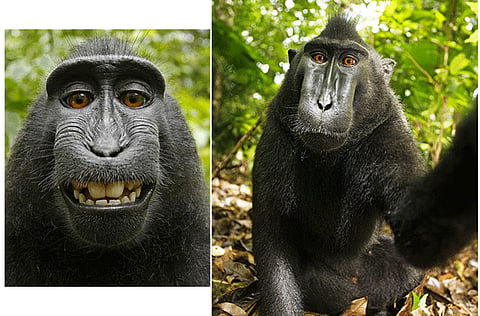Photographer goes bananas over monkey selfie
Wikimedia won’t take down photograph ‘because animal pushed the shutter’

London: Staring straight into the camera, with lips pulled back into a grin, it could be regarded as a perfect “selfie”.
The series of “self portraits” of a crested black macaque monkey were shared around the world over the internet and on social media. But the now famous images are at the centre of a bizarre dispute over who owns the pictures.
David Slater, the British nature photographer whose camera captured the picture, has asked Wikimedia, the organisation behind Wikipedia, to remove the image from its pages. He claims its inclusion in a media library that allows other websites to use it free of charge is harming his ability to make a living.
But Wikimedia has rejected his request, claiming the macaque that pressed the shutter on the camera owns the copyright of the image, not Slater, who now faces an estimated £10,000 legal bill to take the matter to court.
He said: “If the monkey took it, it owns copyright, not me; that’s their basic argument. What they don’t realise is that it needs a court to decide that.
“I’ve told them it’s not public domain, they’ve got no right to say that it’s public domain. A monkey pressed the button, but I did all the setting up.”
Slater obtained the image while he was in Indonesia in 2011 attempting to get the perfect image of a crested black macaque. One of the animals came to investigate his equipment, hijacked a camera and took hundreds of “selfies”. Many of them were blurry and some were pointed at the jungle floor, but among them was a self-portrait of a macaque appearing to grin.
“They were quite mischievous, jumping all over my equipment, and it looked like they were already posing for the camera when one hit the button,” Slater said at the time.
“The sound got his attention and he kept pressing it. At first it scared the rest of them away but they soon came back - it was amazing to watch.
“He must have taken hundreds of pictures by the time I got my camera back, but not very many were in focus. He obviously hadn’t worked that out yet.”
After the image appeared around the world, it was added to Wikimedia Commons, a collection of over 22 million images and videos that are free to use online.
Slater, who is based in Gloucestershire, claims the move is jeopardising his ability to make a living as anyone can take the image from the site and publish it without having to pay him a royalty.
He complained to Wikimedia that he owned the copyright, but a recent transparency report from the group, which details all the removal requests it has received, shows editors decided the monkey owned the copyright because it pressed the shutter button.
Slater said that the photography trip was extremely expensive and that he has not made much money from the image despite its enormous popularity.
“That trip cost me about £2,000 for that monkey shot. Not to mention the £5,000 of equipment I carried, the insurance, the computer stuff I used to process the images. Photography is an expensive profession that’s being encroached upon. They’re taking our livelihoods away.”
Meanwhile, Jimmy Wales, Wikipedia’s founder, has described the EU’s “right to be forgotten” legislation as “deeply immoral”. Speaking at Wikipedia’s annual Wikimania conference in London yesterday (Wednesday), Wales said: “History is a human right and one of the worst things that a person can do is attempt to use force to silence another.” The legislation allows European citizens to request that links to “inadequate, irrelevant or no longer relevant” information be removed from search results. The web pages themselves remain online, but the links from search engines disappear.



